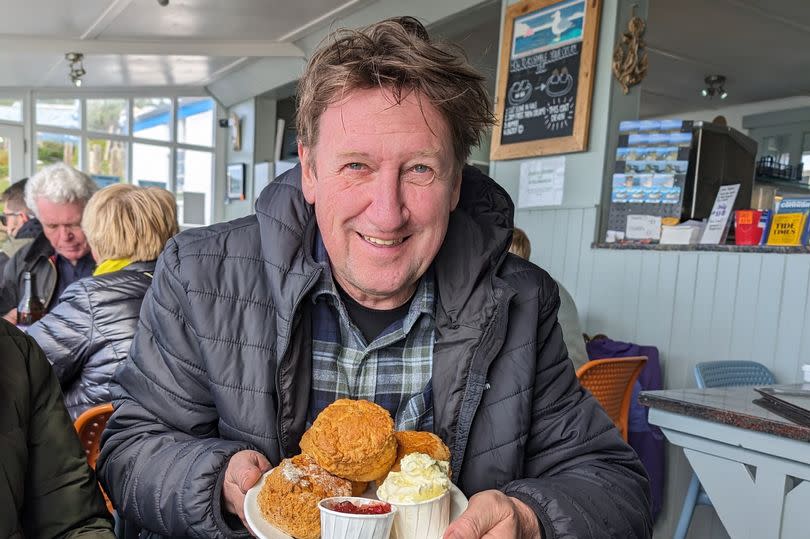Asian Hornet attacked me and stung me under my eye in Somerset
Forgive me for feeling a bit nervous… as I write, social media is revealing how several friends and acquaintances have been spotting European Hornets this week – which is worrying because last summer at Hesp Towers we were plagued by a colony of the still rare, but much-dreaded and highly aggressive, Asian Hornets. One stung me just under the eye before a friend nuked the lot of them with petrol.
I’ve since been told I should have reported the appearance of these beastly incomers, but at the time I was more interested in their rapid demise.
Yet another example of living in a bubble, I suppose… every hour of every day the news is filled with horrors – people are starving, being bombed, shot at, drowned in floods – and what do I worry about? A few stinging insects.
Hesp Out West: The Somerset walk with views from 'the top of the world'
That’s just how we are wired. Of course we feel most concern when it comes to what’s going on in our own backyard. The real tangible stuff we can see, hear, feel, taste and smell is bound to grab our attention first and foremost. During most of our two-million-plus year history, humans wouldn’t have had a clue about what was going on over the next hill, let alone the next county. The other side of the planet may as well have been Mars.
This instant and seemingly endless diet of world-awareness is a new thing and the poor old human thought-processes, evolved over millennia, are having a hard time dealing with it.
The reality is that we are living increasingly isolated lives, a fact which might be responsible for so many of today’s mental health problems. Society used to be more community-focused. In the Westcountry village where I grew up, every inhabitant from schoolboy to great-granny knew everyone else. This is very much not the case now. An old school friend, who still lives and works there, told me: “I shouldn’t think I know a tenth of the people in the village today.”
In the last 30 or 40 years, we have become more cocooned and solitary.
The steady demise of the public house bears witness to this. When I was a young reporter I can, for example, remember parish councillors piling out of village or church halls after a meeting and diving straight into the pub. Back then, week-night closing was 10.30 and the bar would still be packed as the landlord called last orders.
Today, most country pubs will be fairly empty by closing time on a week-night. The inns which have survived might be busy between the hours of 6.30 and 9.00 when they’re serving food, but after that most folk will have gone off home to be alone with their giant TVs or miniature phone-screens. Which might be a good thing as far as alcohol consumption is concerned, but it doesn’t exactly shout community togetherness.

I left my early cub-reporter role to spend some time living in America, and I recall being shocked by the insular and lonely nature of a city like Houston. Partly because of the heat and humidity, no one walked anywhere. Ever. There were drive-ins for everything from burgers to movies. Because no one went outdoors, you never even got to meet your immediate neighbour.
I was once nearly arrested for having the gall to walk to the nearest post office, located in a giant shopping mall. The two policemen sitting in their car could not believe I was walking for the exercise. Once or twice we drove miles to go to bars or nightclubs, only to find they were dingy and unwelcoming places. If you didn’t count the people you saw in cars or inside air-conditioned malls, Houston was a human-free zone.
Hesp Out West: Westcountry's coastal gem where 'summer' has arrived but tourists haven't
I remember feeling a glow of pride dear old England wasn’t like that. No isolated, insular, air-conditioned, bubbles for us… We had things like friendly pubs and homely village shops and post offices. In our glorious homeland, you could go to any quaint market-town high street and see humanity writ large. Stores full of people rather than drive-in malls. Pavements populated with people stopping to gossip and chat rather than dark underground parking lots.
Back in 1979, Houston felt like something from a dystopian nightmare – place devoid of any sense of human community. Thank God jolly old England would never be that way, is what I thought at the time.
Now, travelling through the Westcountry, I pass village after village where both pub and post-office have closed. I visit once thriving market-towns where shops are boarded up and where pedestrian areas are empty, save for a few sad folk puffing vapes. I know this doesn’t paint the whole picture, but you know what I mean.
Yes, car parks at the big discount stories are full, but once we’ve got our industrially produced food and cheap booze, we slink off home to binge-watch some meaningless tripe on a streaming platform and use the internet to book holidays in far off places that aren’t like England. On some screen or other, a news flash will alert us to yet another appalling thing happening in Gaza, and we will feel distraught, hopeless and alone.
No wonder an invasion of killer bees or hornets is enough to put a chap on edge. The smaller the bubble, the bigger the nightmare.
Want the latest Somerset breaking news and top stories first? Click here to join our WhatsApp group. We also treat our community members to special offers, promotions, and adverts from us and our partners. If you don’t like our community, you can check out any time you like. If you’re curious, you can read our Privacy Notice.

 Yahoo News
Yahoo News 
